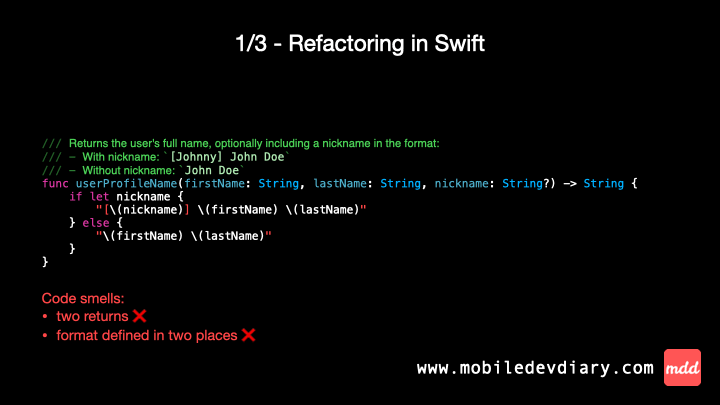Swift code refactor in action 👨🏻💻
Common scenario: formatting user profile name - I bet any of you faced this kind of task.
At first glance, it look straightforward, but when you take a closer look, you’ll notice two potential improvements:
1️⃣ One single return - simplification of the function flow.
2️⃣ Centralised formatting logic - reduces the chance of bugs.
Check out the animated gif and the code where I refactor to address these issues.
Advice: The easiest and fastest way to validate your refactor is to have the code unit tested, so remember to test it before you start refactoring!
Gif ⤵️

Code ⤵️
#1
/// Returns the user's full name, optionally including a nickname in the format:
/// - With nickname: `[Johnny] John Doe`
/// - Without nickname: `John Doe`
func userProfileName(firstName: String, lastName: String, nickname: String?) -> String {
if let nickname {
"[\(nickname)] \(firstName) \(lastName)"
} else {
"\(firstName) \(lastName)"
}
}
#2
/// Returns the user's full name, optionally including a nickname in the format:
/// - With nickname: `[Johnny] John Doe`
/// - Without nickname: `John Doe`
func userProfileName(firstName: String, lastName: String, nickname: String?) -> String {
nickname.map { nickname in ["[\(nickname)]", firstName, lastName].joined(separator: " ") }
?? [firstName, lastName].joined(separator: " ")
}
#3
/// Returns the user's full name, optionally including a nickname in the format:
/// - With nickname: `[Johnny] John Doe`
/// - Without nickname: `John Doe`
func userProfileName(firstName: String, lastName: String, nickname: String?) -> String {
[nickname.map { nickname in "[\(nickname)]" }, firstName, lastName]
.compactMap { $0 }
.joined(separator: " ")
}
Thanks for reading. 📖
I hope you found it useful!
If you enjoy the topic don’t forget to follow me on one of my social media - LinkedIn, X, Mastodon, Bluesky or via RSS feed to keep up to speed. 🚀
